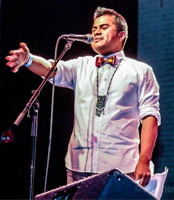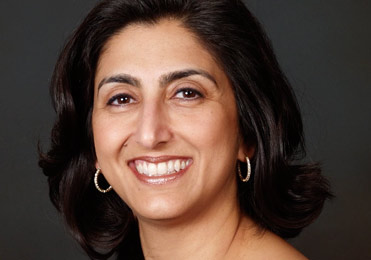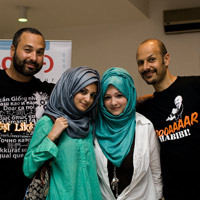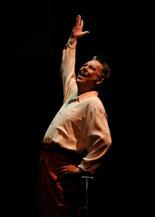All Events

MCC in IV
An Evening of Spoken Word
Coffee Collaborative-6560 Pardall Rd., Isla Vista
Nationally acclaimed spoken word poet Yosimar Reyes will join us for an evening of powerful and moving poetry based on issues facing queer immigrant youth. The event will be hosted by Reyes and is an open mic for anyone to artistically express themselves while educating others on current issues. Be prepared to come up on stage and share your talents in this safe space for a night of 'edutainment'.

Race Matters Series
South Asian Youth Activism: Resisting Racism Through Fusion Music Falu Bakrania
MCC Lounge
South Asian youth have long resisted racism through various forms of fusion music, including bhangra and Asian Underground. In this talk, Bakrania will trace the history of this resistance, examining music by a range of artists as well as the club-going practices of fans. She will also interrogate this history, illuminating entrenched forms of sexism and classism. Her goal is to broaden our understanding of resistance in youth culture and therefore of pathways to social justice. Falu Bakrania is Associate Professor of Race and Resistance Studies in the College of Ethnic Studies at San Francisco State University. Books will be sold following the presentation. Falu Bakrania is the author of Bhangra and Asian Underground: South Asian Music and Politics of Belonging in Britain and is Associate Professor of Race and Resistance Studies in the College of Ethnic Studies at San Francisco State University. Co-sponsored by the Center for the Interdisciplinary Study of Music

Cup of Culture-Fun at the MCC
Just Like Us
MCC Theater
Through a celebration of culture and comedy, this film uproots the widely held misconception that Arabs have no sense of humor - when in fact they are just like us. Featuring Egyptian American comedian Ahmed Ahmed, this film reintroduces socially relevant issues to the world in an effort to build cultural bridges in this age of greater tolerance, understanding, and acceptance. Ahmed Ahmed, 72 min., English & Arabic with English subtitles, 2010, USA.
Co-sponsored by the Center for Middle East Studies; the Education Abroad Program; and EOP-Middle Eastern Resource Center.

Performance
¡Gay Tino! Dan Guerrero
MCC Theater
¡GAYTINO! is a remarkable life journey from 1950s East LA to New York’s Great White Way in the 60s and 70s and back to Hollywood. A gay Chicano moves from the back of the bus to the front of American pop culture in this autobiographical play with music. The solo piece is driven by Dan’s lifelong friendship with the late Chicano artist Carlos Almaraz and by Dan’s father, Chicano music legend, Lalo Guerrero. The 90-minute performance travels through decades of Mexican American history and the gay experience from a unique and personal perspective. Touching, provocative, hilarious and absolutely one-of-a-kind, Dan Guerrero brings his two fascinating worlds together in a riveting solo show. Co-sponsored by the UCSB Library, California Ethnic & Multicultural Archives (CEMA), Special Collections; the Chicano Studies Institute; the Department of Chicano Studies; the Department of Theater and Dance; El Congreso; La Familia de Colores; the Office of the Associate Vice Chancellor for Diversity, Equity and Academic Policy; the Office of Equal Opportunity and Sexual Harassment/Title IX Compliance; the Office of the Executive Vice Chancellor; and the Resource Center for Sexual & Gender Diversity.
